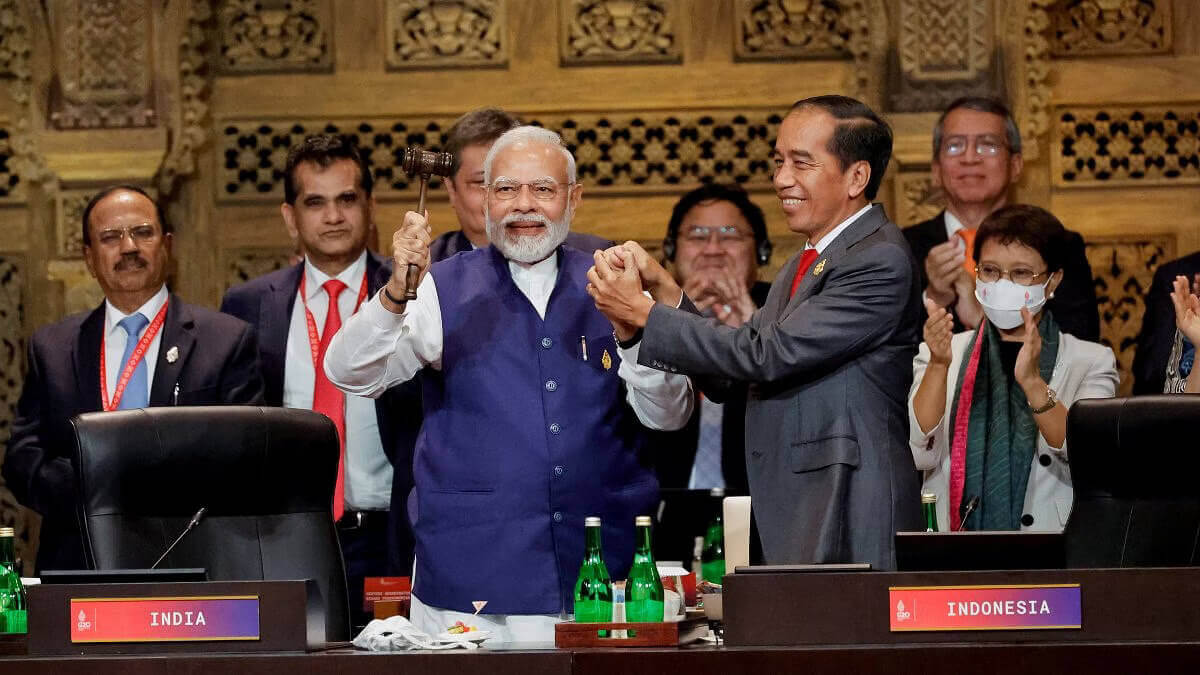The G20 is a one-of-a-kind multilateral organisation that puts countries like the United States (US) on the same footing as developing countries from the Global South, including Argentina, India, and Mexico. Accounting for 85% of the world’s GDP and 75% of international trade, it has been lauded as a critical organisation in fostering international economic cooperation.
In this respect, at a time when the world appears more divided than at any point since the Cold War, India, a country that claims not to subscribe to bloc politics and maintains friendly relations with both the West and the East, can be the driving force for change the multilateral sphere during its year-long presidency. In particular, it has vowed to focus on better representing the cause of the Global South.
During the summit in Bali last month, Indian PM Narendra Modi pledged to use the opportunity to push for a “new world order,” one that is truly “inclusive, ambitious, decisive, and action-oriented.” He stressed on the need for a collaborative effort to address the “havoc” caused by the COVID-19 pandemic, the Ukraine war, and climate change. In this regard, he said there is a need for “greater expectations from the G20.”
In fact, the G20 was born out of similar circumstances to the challenges we face now, emerging from the wreckage of the 1997-1999 Asian Financial Crisis. Driven by the realisation that certain countries do not have adequate representation in conversations about global economic cooperation, finance ministers and bank governors from the 20 countries came together for an informal meeting for the first time.
The grouping was eventually elevated to summit-level meetings during the 2008 financial crisis, when leaders set up a Financial Stability Board, took down trade barriers, and introduced $4 trillion in measures to revive members’ economies. The G20 also worked with institutions like the Organisation for Economic Cooperation and Development and the International Energy Agency to bring down skyrocketing energy prices.
India is a strong partner of the United States, and I look forward to supporting my friend Prime Minister Modi during India’s G20 presidency.
— President Biden (@POTUS) December 2, 2022
Together we will advance sustainable and inclusive growth while tackling shared challenges like the climate, energy, and food crises. https://t.co/EsTK9XdsCp pic.twitter.com/dTpBdiTJM0
During the recent COVID-19 crisis, too, the G20 was more successful than organisations like the World Health Organisation and the UN in providing economic relief to the Global South. Under Saudi Arabia’s presidency, the group introduced the Debt Service Suspension Initiative, suspending $12.9 billion in debt owed by 48 out of 73 eligible countries to private creditors and international banks.
Saudi Arabia’s presidency was then followed by Indonesia, which has been succeeded by India. The leadership of the grouping will next move on to Brazil and South Africa, giving the developing world, and in particular the Global South, significant influence. For the next few years, the Troika meetings, which comprise the outgoing, current, and incoming presidencies of the G20, will involve Global South nations.
During this period, India can press hard for differentiated responsibility on transformational changes to policies on climate action, transition to green energy, and digitisation. For instance, it can build on the momentum generated by the recent COP27 climate conference, during which member nations, for the first time ever, agreed to adopt a “loss and damage” fund for the world’s most vulnerable countries. Climate agreements like the Paris Climate Accords have been rendered largely meaningless because countries have found loopholes or ignored the agreement entirely. India can, therefore, push to ensure that developed nations carry their weight and are held accountable.
Our endeavour is to create consensus, champion global south & shape agenda under India G20 Presidency, says EAM Jaishankar in Rajya Sabha; Adds, G20 will "showcase India to the world" https://t.co/x2DgvkZ5Ar
— Sidhant Sibal (@sidhant) December 7, 2022
One of India’s key strengths is its perceived neutrality by both the East and the West, wherein it can avoid getting trapped in a proxy war and playing bloc politics for the benefit of the international community.
In fact, India reportedly played a pivotal role in achieving consensus and finalising the joint statement during the recent G20 summit in Bali. US Principal National Security Advisor Jon Finer lauded PM Modi’s role, saying that the G20 showed that New Delhi is “instrumental in forging a consensus” among “far-flung countries.”
Keeping this in mind, Indian Sherpa Amitabh Kan has said New Delhi will bring to the G20 “international leadership,” driven by the “true spirit” of “consensus building.”
Nevertheless, numerous challenges await India in its goal of making the G20 a truly effective organisation. Crucially, the organisation is largely consultative and does not work on implementing legally binding changes. Moreover, it is an entirely financial and economic organisation and does not have the ability to work on political and security issues such as Chinese expansionism and the Ukraine war. That being said, while the G20 itself may not be able to institute such transformations, India can use its leadership to elevate its status and strengthen its continued push for multilateral reform.

